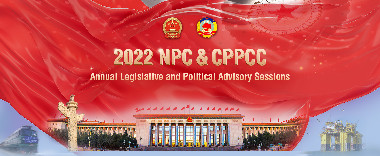Spotlight Focuses on Road to Future

A worker produces engines at a workshop of Harbin Dongan Automotive Engine Manufacturing Co Ltd in Northeast China's Heilongjiang province, Feb 25, 2021. [Photo/Xinhua]
New engines
Dong Zhiyong, dean of Peking University's School of Economics, said China should step up the fostering of strategic emerging industry and development of new technologies to make them new engines to drive the economy and ensure stability of industrial and supply chains.
In terms of opening-up, China has said on various occasions it will keep opening its door wider to the world. In November, it signed the world's biggest free-trade agreement, the Regional Comprehensive Economic Partnership, with 14 Asian partners after eight years of negotiations.
A month later, China and the European Union announced the conclusion of negotiations on the Comprehensive Agreement on Investment. The country is also considering joining the Comprehensive and Progressive Agreement for Trans-Pacific Partnership, a trade agreement that evolved from the Trans-Pacific Partnership and covers a number of economies in Asia-Pacific and Latin America.
Wang Shouwen, vice-minister of commerce, said last week that China had made informal contact with some of the CPTPP's 11 members. The country plans to continue informal discussions with other members at a technical level to better understand the content of the agreement, Wang said.
Wei Jianguo, vice-chairman of the China Center for International Economic Exchanges, said the next step for the country should be to improve its market system to make it fair and transparent, and provide a level playing field to domestic and international companies.
During the pandemic, China took the lead among major world economies, achieving positive economic growth last year, with an annual GDP expansion of 2.3 percent.
As the virus continues to rage across the world, and uncertainty and instability increase, the country faces tremendous challenges as it embarks on economic recovery.
Yan Zhi, an NPC deputy from Hubei province, said he wants to see more policy announcements at the two sessions to support the development of private companies.
"As a businessman, I hope to improve laws and regulations that help strengthen property protection for private companies," said Yan, chairman of the Zall Group, a company specializing in property and trading services for the wholesale market in Wuhan, the Hubei provincial capital.
He said he also wants to see policy support from the government to reduce the impact of the pandemic on private business.
Experts said that due to the pandemic, it might be difficult for the government to set a specific GDP growth target this year. Instead, it is likely to place greater emphasis on high-quality expansion.
Iris Pang, chief economist for Greater China at Dutch bank ING, said: "Although we may not get a GDP growth target from the two sessions, we forecast GDP to grow by around 7 percent in 2021. This is largely due to the low base of only 2.3 percent growth in 2020.
"Structurally, we do not think the economy will change a lot. Domestic demand is still likely to act as the economy's main stabilizer, while external demand could still be fragile as key export destinations slowly reopen after the pandemic," Pang said, adding that international politics could continue to have an important impact on Chinese business.
Mo Jingxi and Cui Jia contributed to this story.



